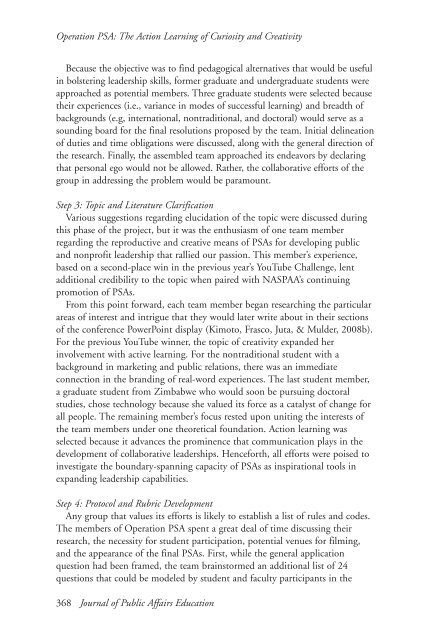JOURNAL OF PUBLIC AFFAIRS EDUCATION - naspaa
JOURNAL OF PUBLIC AFFAIRS EDUCATION - naspaa
JOURNAL OF PUBLIC AFFAIRS EDUCATION - naspaa
Create successful ePaper yourself
Turn your PDF publications into a flip-book with our unique Google optimized e-Paper software.
Operation PSA: The Action Learning of Curiosity and Creativity<br />
Because the objective was to find pedagogical alternatives that would be useful<br />
in bolstering leadership skills, former graduate and undergraduate students were<br />
approached as potential members. Three graduate students were selected because<br />
their experiences (i.e., variance in modes of successful learning) and breadth of<br />
backgrounds (e.g, international, nontraditional, and doctoral) would serve as a<br />
sounding board for the final resolutions proposed by the team. Initial delineation<br />
of duties and time obligations were discussed, along with the general direction of<br />
the research. Finally, the assembled team approached its endeavors by declaring<br />
that personal ego would not be allowed. Rather, the collaborative efforts of the<br />
group in addressing the problem would be paramount.<br />
Step 3: Topic and Literature Clarification<br />
Various suggestions regarding elucidation of the topic were discussed during<br />
this phase of the project, but it was the enthusiasm of one team member<br />
regarding the reproductive and creative means of PSAs for developing public<br />
and nonprofit leadership that rallied our passion. This member’s experience,<br />
based on a second-place win in the previous year’s YouTube Challenge, lent<br />
additional credibility to the topic when paired with NASPAA’s continuing<br />
promotion of PSAs.<br />
From this point forward, each team member began researching the particular<br />
areas of interest and intrigue that they would later write about in their sections<br />
of the conference PowerPoint display (Kimoto, Frasco, Juta, & Mulder, 2008b).<br />
For the previous YouTube winner, the topic of creativity expanded her<br />
involvement with active learning. For the nontraditional student with a<br />
background in marketing and public relations, there was an immediate<br />
connection in the branding of real-word experiences. The last student member,<br />
a graduate student from Zimbabwe who would soon be pursuing doctoral<br />
studies, chose technology because she valued its force as a catalyst of change for<br />
all people. The remaining member’s focus rested upon uniting the interests of<br />
the team members under one theoretical foundation. Action learning was<br />
selected because it advances the prominence that communication plays in the<br />
development of collaborative leaderships. Henceforth, all efforts were poised to<br />
investigate the boundary-spanning capacity of PSAs as inspirational tools in<br />
expanding leadership capabilities.<br />
Step 4: Protocol and Rubric Development<br />
Any group that values its efforts is likely to establish a list of rules and codes.<br />
The members of Operation PSA spent a great deal of time discussing their<br />
research, the necessity for student participation, potential venues for filming,<br />
and the appearance of the final PSAs. First, while the general application<br />
question had been framed, the team brainstormed an additional list of 24<br />
questions that could be modeled by student and faculty participants in the<br />
368 Journal of Public Affairs Education
















